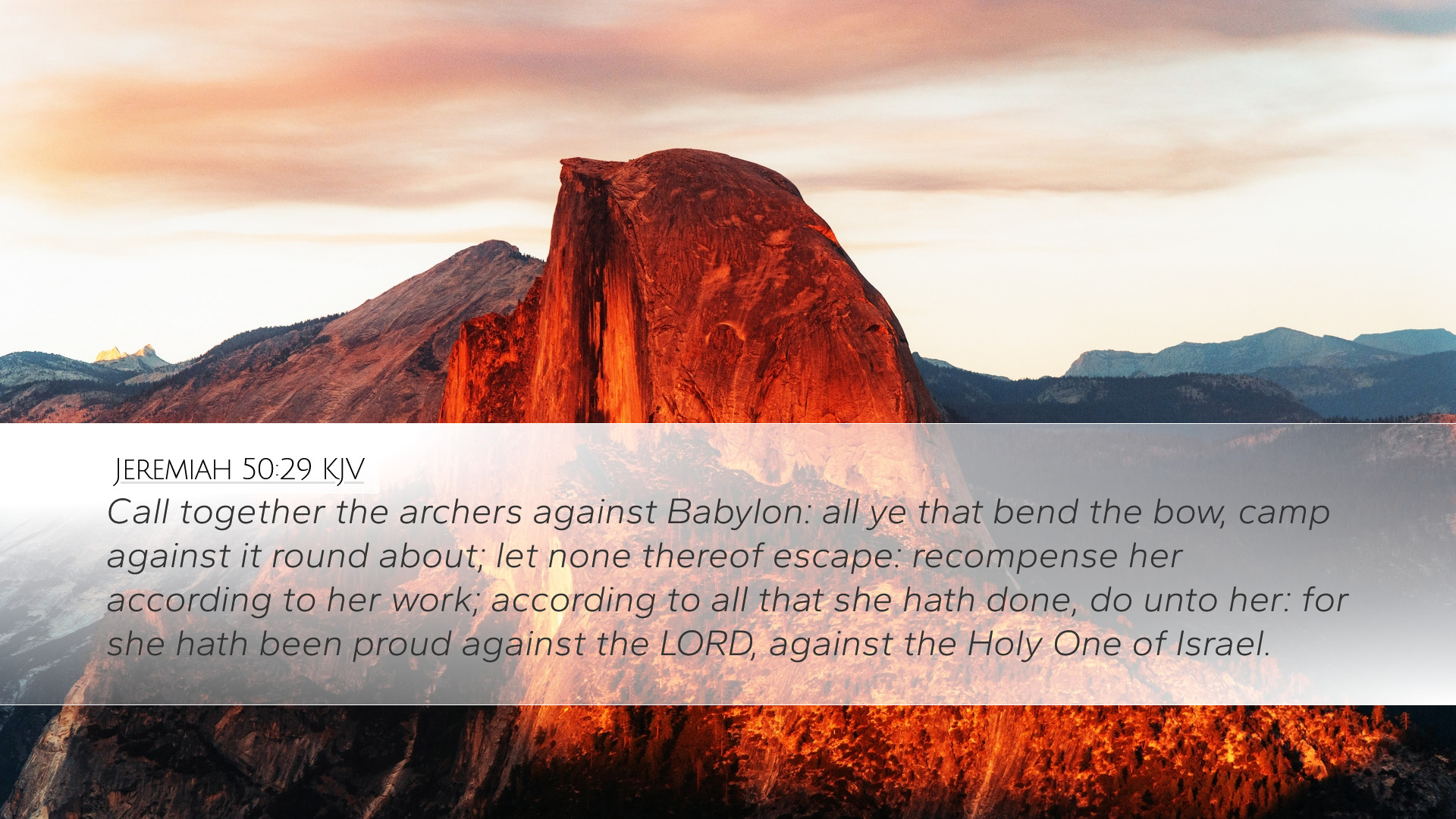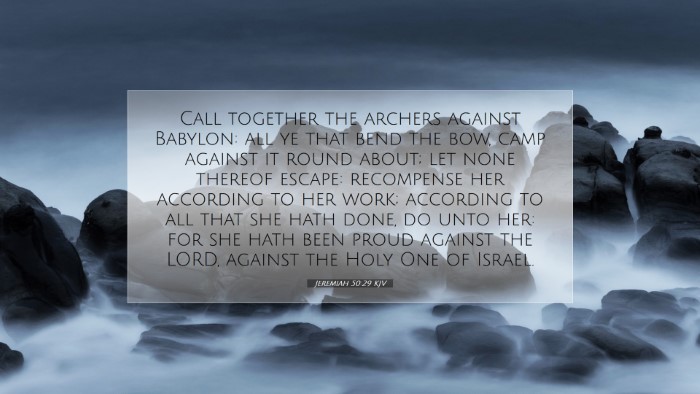Commentary on Jeremiah 50:29
Verse: "Call together the archers against Babylon: all ye that bend the bow, camp against it round about; let none thereof escape: recompense her according to her work; according to all that she hath done, do unto her: for she hath been proud against the LORD, against the Holy One of Israel."
Introduction
This verse is part of a passage that contains a prophecy against Babylon, a major antagonist in the narrative of the Hebrew Scriptures. The prophet Jeremiah speaks of a time when Babylon will face divine retribution for her pride and idolatry. This commentary will explore various insights drawn from notable public domain commentaries, elaborating on the significance of this verse for pastors, students, and theologians.
Historical Context
Understanding the historical context of Jeremiah's prophecy is crucial. Babylon was an empire characterized by vast power, but it was also known for its arrogance and idol worship. Jeremiah prophesied during a tumultuous period when the Babylonians were at the height of their strength but destined for downfall.
Matthew Henry's Insights
Matthew Henry emphasizes the notion of spiritual warfare inherent in this verse. He notes that the call to "camp against it round about" can be understood as both a literal military strategy and a spiritual call to arms against sin and pride.
- Spiritual Archers: Henry suggests that the "archers" represent those who are divinely appointed to execute God's judgment. They symbolize the Lord's power to utilize any means necessary to bring about justice.
- Pride of Babylon: The mention of Babylon's pride against the Lord serves as a reminder to believers of the dangers of arrogance and self-sufficiency.
Albert Barnes' Perspective
Albert Barnes, in his commentary, focuses on two key elements: the calling of the archers and the recompense due to Babylon. He interprets this call as an extensive mobilization of nations against Babylon.
- Mobilization Against Evil: Barnes highlights that just as Babylon mobilizes against Israel, so too will the nations rise against her in response to her wickedness.
- Divine Justice: Barnes draws attention to the principle of recompense—that Babylon's actions will return upon her. This echoes the biblical theme of sowing and reaping, reinforcing the moral order of the universe.
Adam Clarke's Commentary
Adam Clarke provides a deep exploration of the phrases used within the text. He discusses how “call together the archers” illustrates both the physical and spiritual elements of warfare.
- Symbolism of Archers: Clarke posits that archers are a metaphor for skilled execution of God's justice. The accuracy and deliberation involved in archery reflect the precision of divine judgment.
- The Lord's Anger: He stresses that Babylon's pride is not merely a political issue but an affront to the holiness of God, indicating God's righteous indignation.
Theological Implications
This verse presents several significant theological implications for the readers. Firstly, it reveals God's sovereignty over nations and historical events. Secondly, it underscores the consequences of pride and rebellion against God. The call to arms against Babylon serves as a warning to all who confront divine authority.
Consequences of Pride
The sustained emphasis on Babylon's pride against the Lord serves as a poignant reminder to contemporary readers of the humility required in their relationship with God. As proclaimed by Proverbs 16:18, “Pride goes before destruction, and a haughty spirit before a fall.”
The import of this warning extends beyond a single nation, speaking to the heart of every believer. When one elevates oneself above God, judgment is assured.
God's Justice in Action
This verse illustrates a core tenet of Judeo-Christian theology: the assurance of God's justice. The mobilization of nations against Babylon illustrates the profound truth that God will not allow unrighteousness to go unpunished.
Pastors and theologians can draw from this passage the principle of divine oversight in human affairs, emphasizing that righteousness is ultimately divinely rewarded, and evil met with divine retribution.
Practical Applications
In light of Jeremiah 50:29, several practical applications emerge for those ministering within the church and studying the Scriptures:
- Embrace Humility: This passage encourages believers to cultivate humility in their lives, recognizing the dangers of pride and self-reliance.
- Recognize Divine Sovereignty: Understanding that God is in control should motivate believers to trust Him amid adversity and chaos.
- Seek Justice: Believers are called to pursue justice, reflecting the character of God in their communities and standing against oppression and wrongdoing.
Conclusion
Jeremiah 50:29 serves as a powerful reminder of God's sovereign governance and the reality of divine justice. It challenges the proud and reassures the humble, indicating that God's purpose will ultimately prevail. Through the insights provided by Matthew Henry, Albert Barnes, and Adam Clarke, the depth of this prophetic message is illuminated, offering valuable lessons for modern believers.


